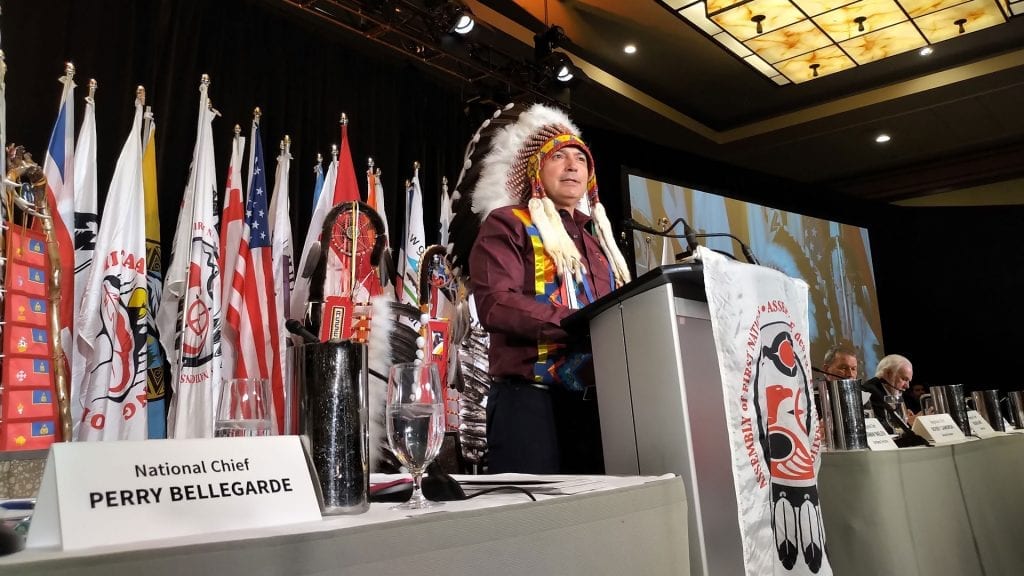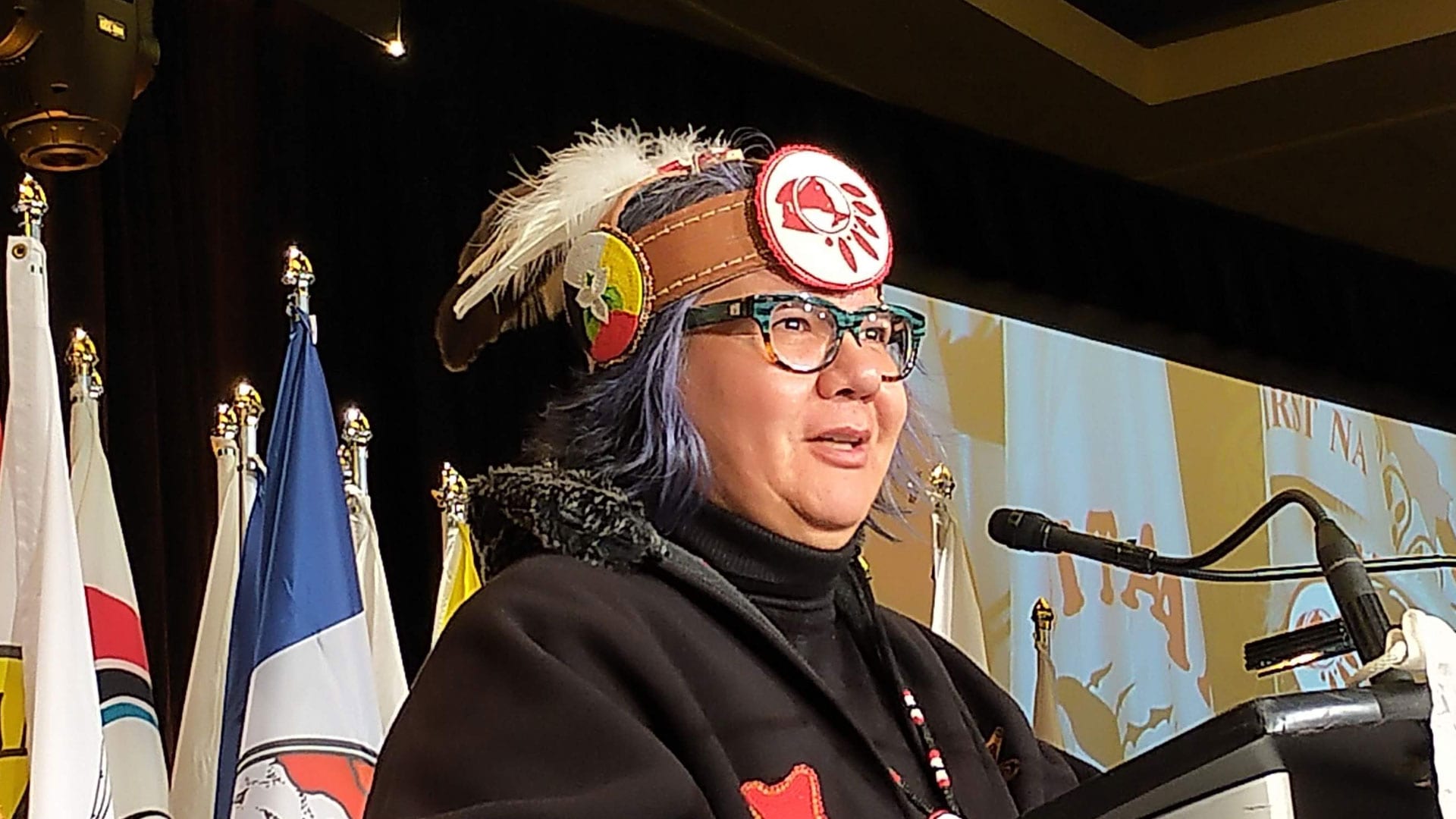
National Chief Perry Bellegarde addresses the delegates during a 2019 assembly. Photo: APTN
The Chiefs of Ontario is accusing the head of the Assembly of First Nations of being “clearly in a conflict of interest” over contracts issued to an Ottawa-based consulting company owned by his spouse, according to a memo obtained by APTN News.
Valerie (Galley) Bellegarde is the sole proprietor of Indigenous Languages Revitalization Associates, an unincorporated company whose principal place of business is a home she and National Chief Perry Bellegarde co-own in the nation’s capital, according to the Ontario business and land registries.
The arrangement has the COO concerned the national chief may have breached sections of the AFN code of conduct and ethics that prohibit executive chiefs from benefitting financially from their position.
“Under Section 9 (of the code), a contract awarded to an AFN Executive member’s immediate family member, including a spouse, is a financial benefit to that Executive member,” said the March 17 memo. “Under this section, no Executive member is to directly or indirectly receive any profit from their position—doing so is a clear conflict of interest.”
According to its CEO, the AFN has issued four contracts to Valerie Bellegarde’s business since 2014, which was the year Perry Bellegarde won the organization’s top job, getting 60 per cent of the votes on the first ballot.
The consultancy “provided technical support,” authored policy documents and co-ordinated political strategy for the Indigenous Languages Act, according to LinkedIn. The legislation received royal assent in 2019.
It’s not clear how much money the consultancy was paid, though an unverified and undated financial statement obtained by APTN indicated one contract was worth $49,770.

The Ontario chiefs first raised these concerns in a confidential resolution passed during a special assembly in February. The resolution called for an independent financial expert to conduct a review with a “directed focus” on policies and processes for awarding and approving contracts.
COO said it had “reason to believe” the code had been breached but didn’t say by whom. The subsequent memo reasserted these allegations while aiming them squarely at the national chief.
It claims the national chief broke section 13 by chairing a March 9 meeting in which the COO resolution was debated. The section requires executive chiefs recuse themselves from discussions, decisions and votes they have a conflict of interest in.
“It is publicly known that ILRA (Indigenous Languages Revitalization Associates) is owned by the National Chief’s wife. National Chief is clearly in a conflict of interest, yet he chaired the portion of the meeting that dealt with COO Resolution,” said the document.
“It is clear that the National Chief needed to recuse himself from the discussion and should recuse himself from future discussions regarding the independent financial review.”
The document also quotes from section 11, which states, “A perceived or apparent conflict of interest may exist when a reasonable, well informed person has a reasonable belief that a member of the Executive has a conflict of interest, even if there is no real conflict.”
AFN refuses to address allegations of conflict of interest, personal financial benefit
The motion to implement the COO resolution was ultimately voted down during AFN executive meetings on March 30 and March 31.
APTN requested minutes from these minutes, but an AFN spokesperson issued a statement instead.
“After consideration, the Executive decided there is no reason for a financial review and that the internal accounting coupled with the AFN’s annual external auditor’s report is sufficient,” said director of communications Jenna Young Castro in an April 7 email.
The AFN declined several interview requests for this story over the course of days and refused to answer questions about the COO’s allegations of code of conduct breaches.
“AFN is not in receipt of an internal COO memo as you cite below and therefore will not comment,” Castro wrote.
Instead, she supplied a statement from CEO Janice Ciavaglia that insisted the national chief was not involved in decisions to award contracts to a company based in his own home.
“The AFN approached Valerie Bellegarde to conduct work based on her strong vision and internationally respected expertise on Indigenous language rights, and this work was instrumental in achieving ground breaking legislation that benefits all of Canada. National Chief Bellegarde had no involvement in the decision-making to award this contract.” said Ciavaglia.
“Every Assembly of First Nations contract is awarded to advance First Nations priorities and on merit. The contract with Indigenous Languages Revitalization Associates is no exception.”
Read More:
AFN facing conflict of interest concerns, call for independent financial review
AFN executive chiefs to address call for financial review at next meeting: Bellegarde
APTN followed up asking if the national chief recused himself from subsequent meetings.
“The National Chief recused himself from the in-camera portion of the meeting that related to contracts on March 30,” Castro replied.
In a past email, Ciavaglia said all contracts—whether sole sourced or tendered through a competitive process—are reviewed to ensure they adhere to conflict of interest rules.
“All contracts in excess of $25,000 in a fiscal year are reviewed by the Executive Committee,” Ciavaglia wrote. “To the best of my knowledge, there have never been concerns raised by the regional chiefs with regard to contracts to Indigenous Languages Revitalization Associates.”
Contracts worth more than $25,000 do not require executive approval if they are worth less than $50,000, however, which Manitoba regional Chief Kevin Hart confirmed earlier this week.
“When contracts over $50,000 need to be approved they do come to us at the executive level for approval,” he told host Dennis Ward on Face to Face. “With that, we do get the information as well as the briefing note.”
Investigations continue
Hart revealed that the AFN is in the midst of a probe into allegations of a data breach. Hart said he is fully participating in the investigation but declined to comment further. He said he has full confidence in the finance department, management team, CEO and others.
“My understanding is that the AFN has unqualified audits. For myself, I trust my colleagues,” he said, while adding that the chiefs must ultimately decide if they want independent scrutiny. “If the direction comes from the chiefs that we have to have an (independent) audit, then I take my direction from the chiefs.”
Meanwhile, a separate investigation into claims Ontario regional Chief RoseAnne Archibald harassed or bullied staff was launched in February following a preliminary review, Castro explained.
“The AFN Executive Committee, comprised of Regional Chiefs, voted unanimously to proceed with a full investigation into allegations of harassment and bullying made by multiple AFN employees against a Regional Chief,” she wrote at the time.

APTN reached out to Archibald’s office for an interview as well but this was also declined.
She previously accused the national chief of targeting her with the investigation as reprisal for the resolution, which Bellegarde denied.
In addition, the AFN chiefs in assembly passed a resolution in December 2020 calling for an investigative review of sex- and gender-based discrimination at the national advocacy body.
It’s all happening as the race to elect a new head of the lobby organization is set to get underway. Earlier this week, the AFN named Ron Laufer as chief electoral officer.
The nomination period opened May 12 and closes on June 2, while virtual election day is scheduled for July 7.
There are calls for the AFN to delay the election but the executive voted on May 12 to proceed, according to a Globe and Mail report.
The national chief’s tenure is winding down much as it began. Perry Bellegarde drew criticism for hiring his spouse as a political advisor in 2015 but insisted then—as now—that AFN was following all human resources and conflict of interest policies.
All allegations of conflict of interest, code of conduct violations, data breaches and harassment have not been proven.
—With files from Dennis Ward










